
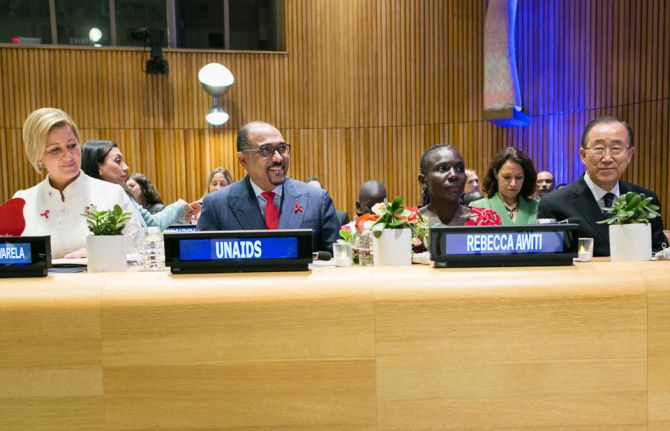
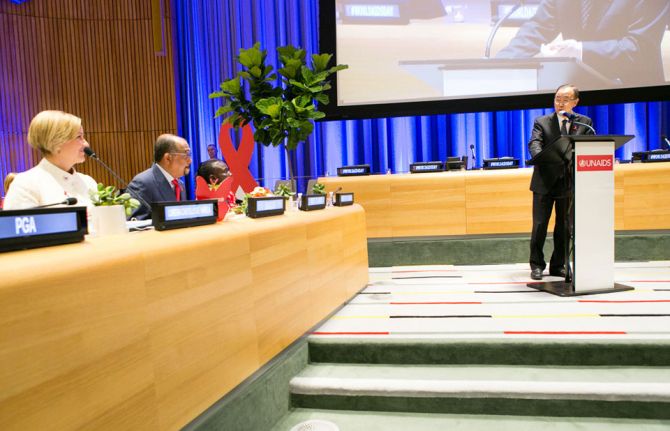
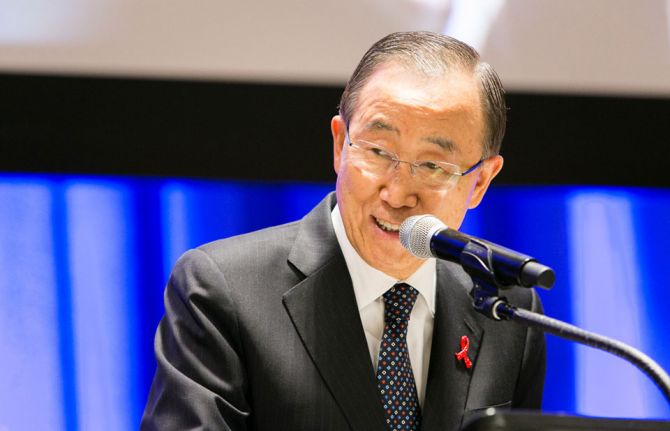
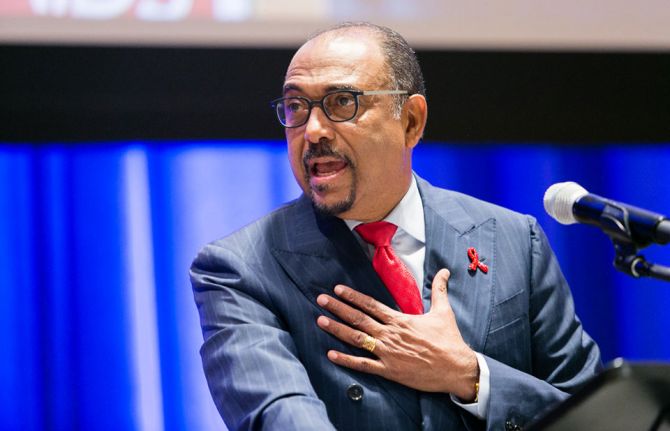
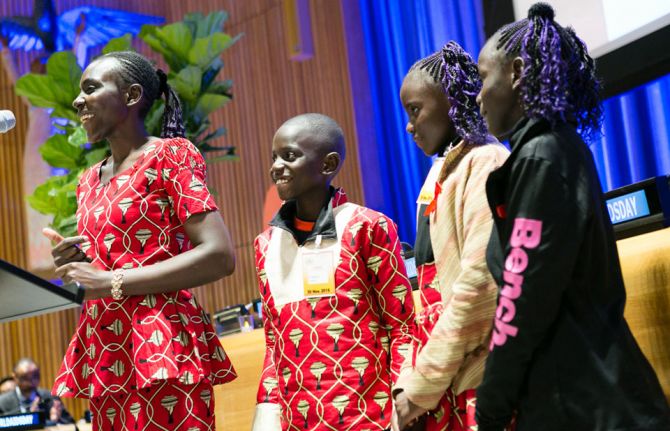
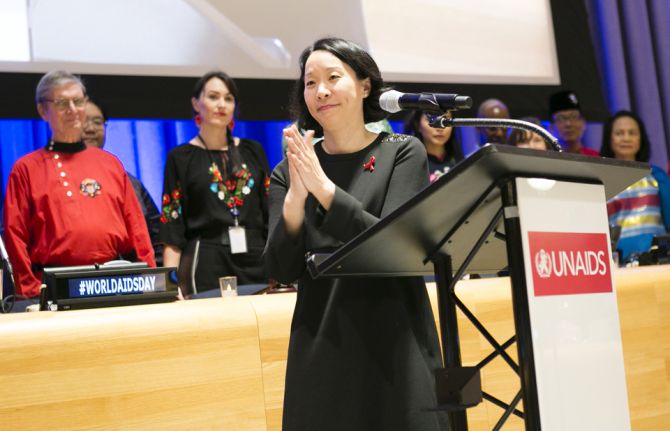
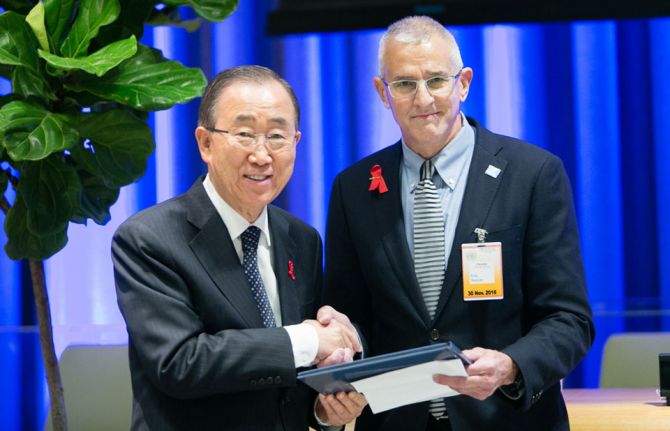
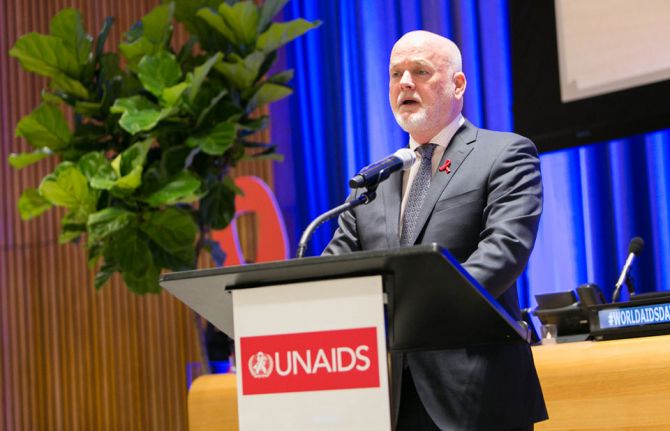
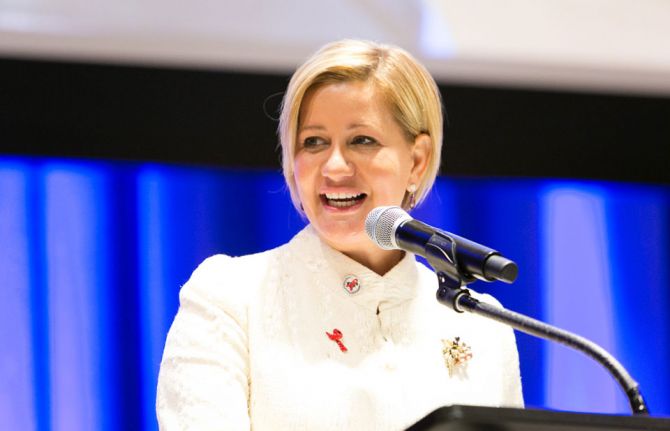
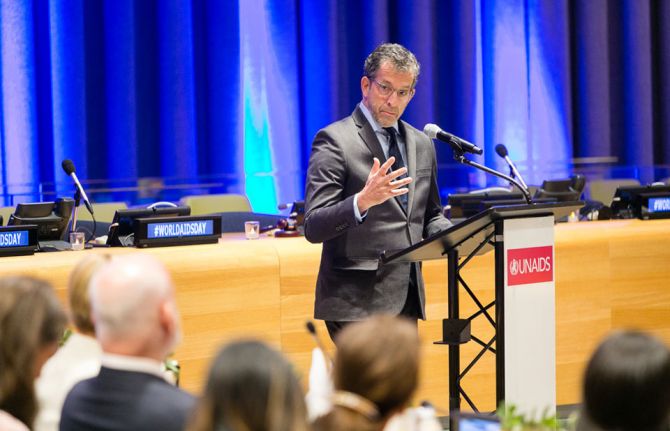
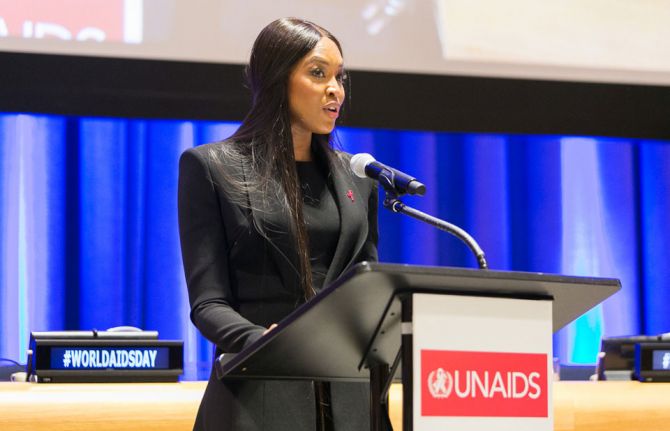
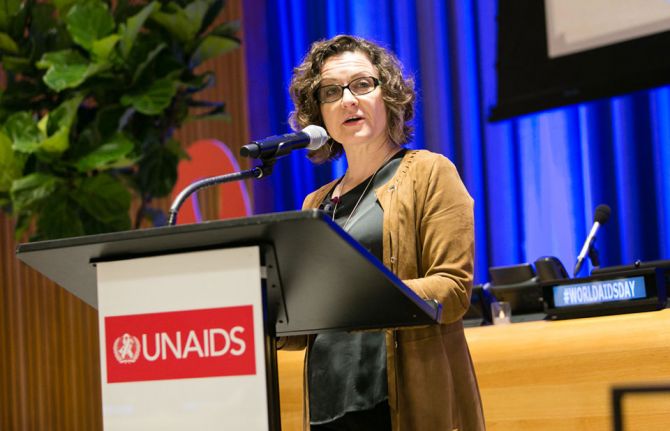
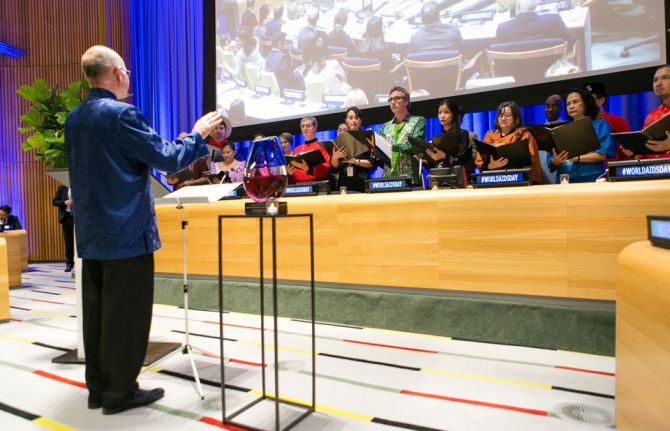
Press Release
UNAIDS hosts World AIDS Day event and honours the UN Secretary-General for his remarkable contributions to the AIDS response
30 November 2016 30 November 2016Speakers urge partners to move forward together to end the AIDS epidemic by 2030 as part of the Sustainable Development Goals
GENEVA/NEW YORK, 30 November 2016—On the eve of World AIDS Day, UNAIDS has hosted a special event at the United Nations Headquarters in New York, United States of America, to commemorate World AIDS Day. The event, Moving Forward Together: Leaving No One Behind, was also held to honour the leadership of the United Nations Secretary-General, Ban Ki-moon, and his remarkable contribution to the response to HIV in advance of his handover to the new Secretary-General, António Guterres, at the beginning of 2017.
Following a moment’s silence to remember the 35 million people who have lost their lives to AIDS, Michel Sidibé, Executive Director of UNAIDS, presented Mr Ban with the UNAIDS Award for Leadership for speaking out on behalf of, and his commitment to, the people most affected by HIV.
Accepting the award, Mr Ban said that he was proud to be an activist for the rights of lesbian, gay, bisexual, transgender and intersex people and spoke of his motivation. “We are motivated to fight AIDS because we know that every child deserves care, every person deserves treatment and all vulnerable groups deserve protection from stigma and abuse. Tolerance and awareness help stop AIDS. Speaking out protects life,” he said.
Mr Sidibé paid tribute to the Secretary-General and the exceptional achievements made in the AIDS response during his tenure. “Secretary-General Ban Ki-moon, you have been a true champion for people living with HIV. When you arrived only three million people were on HIV treatment. Our World AIDS Day report shows that more than 18 million are now on treatment. This isn’t just about numbers, but the very lives of people. You have shown through these years that people’s dignity is central to your agenda,” he said.
Since Mr Ban assumed office as United Nations Secretary-General in January 2007, the number of people living with HIV accessing life-saving antiretroviral therapy has increased from 2.9 million at the end of 2006, to 18.2 million [16.1 million–19.0 million] in June 2016. The number of people who died from AIDS-related illnesses has halved, from 2 million in 2006 to 1.1 million in 2015, and the number of new HIV infections among children has been reduced by two thirds, from 430 000 in 2006 to 150 000 in 2015.
During the event, Mr Ban was reacquainted with Rebecca Awiti, a woman living with HIV who met the Secretary-General in 2011 during an official visit to Kenya, where he launched The Global Plan towards the elimination of new HIV infections among children and keeping their mothers alive. Ms Awiti is the mother of triplets, born free from HIV thanks to antiretroviral medicines. “You brought hope to me, my children and my children’s children that an AIDS-free generation is possible in our lifetime,” she said.
One of the founders of the global HIV treatment access movement, Eric Sawyer, praised the Secretary-General for his commitment to zero discrimination. “Mr Secretary-General, I thank you as a long-term survivor of HIV and as a long-time member of UN Plus and UN Cares, and a member of the Free and Equal campaign, for your leadership, for your compassion and for your commitment to the AIDS response, and for your commitment to equality and human rights for all,” he said.
As a special guest at the event, the First Lady of Panama, Lorena Castillo de Varela, who is also UNAIDS Special Ambassador for AIDS in Latin America, stressed the importance of breaking down the stigma still surrounding HIV and standing firm on zero discrimination. “We must all carry the torch for the Secretary-General and, as leaders, fight discrimination every day of our lives,” she said. “We must celebrate the diversity that unites us, and promote solidarity, respect, inclusion and peace.”
Kenneth Cole, amfAR Chair and a leading fashion designer, warned of a growing population that is disengaged and desensitized to the virus and said it was a critical time to coordinate and Fast-Track the effort to end AIDS. “We can contain and reverse the AIDS epidemic through a coordinated response. I strongly believe we can and must and will make AIDS history,” he said.
The President of the United Nations General Assembly, Peter Thomson, called on the world to do more and reach the clear time-bound targets set by Member States in the 2016 Political Declaration on Ending AIDS. “On this World AIDS Day, we honour those who have passed away by committing to end the AIDS epidemic, achieve the Sustainable Development Goals and build a healthy, safe, peaceful and sustainable future for us all,” he said.
Model, actress and philanthropist Naomi Campbell spoke of the triple threat facing young women and girls of not knowing their HIV status, not accessing life-saving treatment and not being empowered to protect themselves from HIV. “Today, I stand in solidarity with the millions of young women and adolescent girls growing up in a world where they are at risk of HIV,” she said. “I want to make a difference—you can count on me to do what I can to help end AIDS.”
Deputy Executive Director of the United Nations Population Fund, Laura Londén, underscored the importance of working as one to Fast-Track the response to HIV. “We can only reach the goal of ending the AIDS epidemic by 2030 if we are serious about HIV prevention. We need to end the isolation and fear that key populations face every day,” she said.
The event culminated with an inspirational and uplifting performance by the United Nations Choir, which performed Mae, a Japanese song about moving forward.
|
Global summary of the AIDS epidemic in 2015/2016* |
||
|
Number of people living with HIV
|
Total |
36.7 million [34.0 million–39.8 million] |
|
Adults |
34.9 million [32.4 million–37.9 million] |
|
|
Women |
17.8 million [16.4 million–19.4 million] |
|
|
Children (<15 years) |
1.8 million [1.5 million–2.0 million] |
|
|
Number of people newly infected with HIV |
Total |
2.1 million [1.8 million–2.4 million] |
|
Adults |
1.9 million [1.7 million–2.2 million] |
|
|
Children (<15 years) |
150 000 [110 000–190 000] |
|
|
AIDS-related deaths |
Total |
1.1 million [940 000–1.3 million] |
|
Adults |
1.0 million [840 000–1.2 million] |
|
|
Children (<15 years) |
110 000 [84 000–130 000] |
|
|
Number of people on HIV treatment |
Total |
*18.2 million [16.1 million–19.0 million], June 2016 |
UNAIDS
The Joint United Nations Programme on HIV/AIDS (UNAIDS) leads and inspires the world to achieve its shared vision of zero new HIV infections, zero discrimination and zero AIDS-related deaths. UNAIDS unites the efforts of 11 UN organizations—UNHCR, UNICEF, WFP, UNDP, UNFPA, UNODC, UN Women, ILO, UNESCO, WHO and the World Bank—and works closely with global and national partners towards ending the AIDS epidemic by 2030 as part of the Sustainable Development Goals. Learn more at unaids.org and connect with us on Facebook, Twitter, Instagram and YouTube.
Contact
UNAIDS New YorkSophie Barton-Knott
tel. +41 79 514 6896
bartonknotts@unaids.org
UNAIDS Geneva
Alasdair Reid
tel. +41 79 594 1923
reida@unaids.org
Press centre
Download the printable version (PDF)
